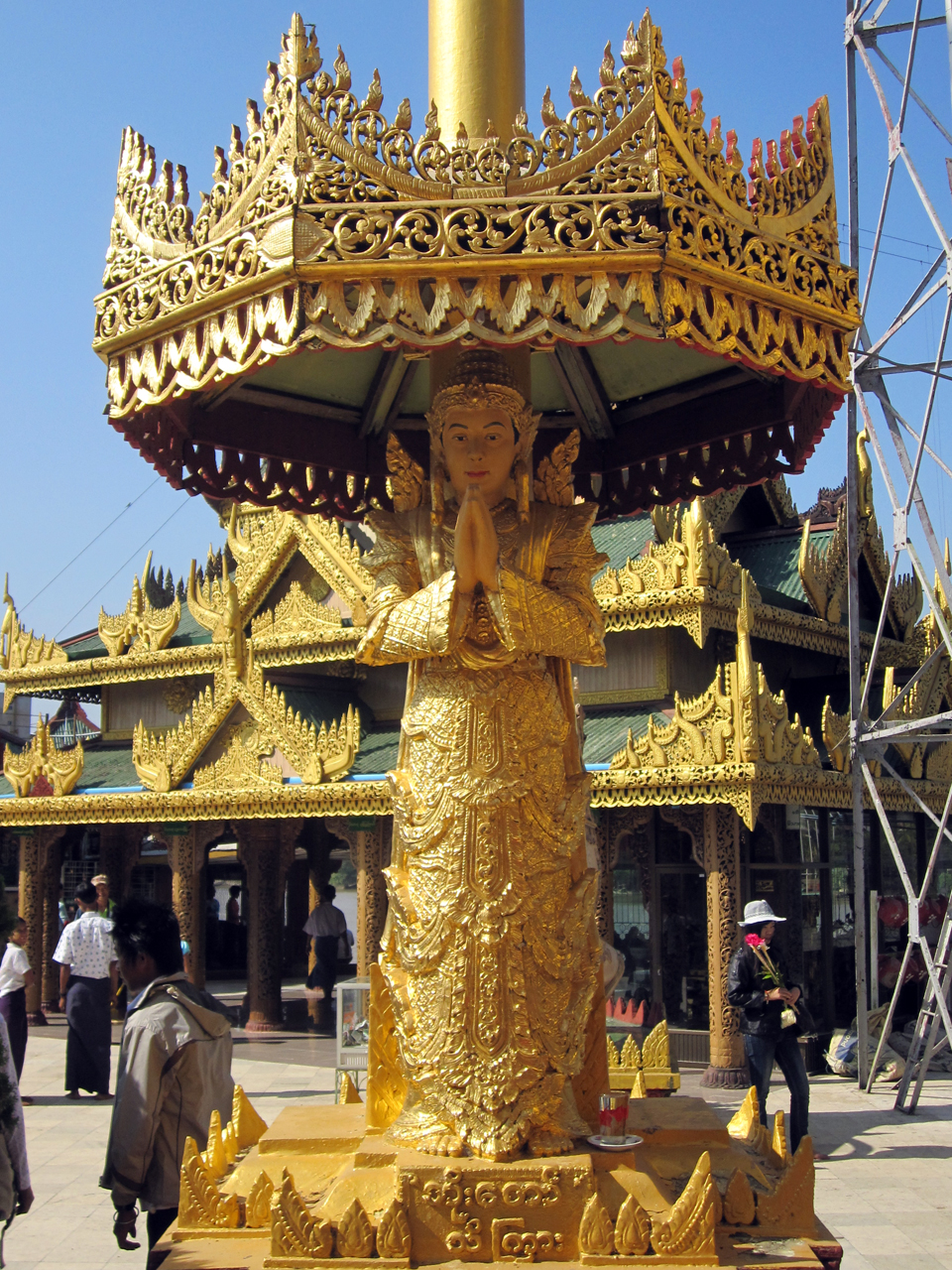Thagyamin on:
[Wikipedia]
[Google]
[Amazon]
 Thagyamin ( my, သိကြားမင်း, ; from Sanskrit ''Śakra'') is the highest-ranking nat (deity) in traditional Burmese Buddhist belief. Considered as the king of Heaven, he is the Burmese adaptation of the Hindu deity Indra.
Thagyamin ( my, သိကြားမင်း, ; from Sanskrit ''Śakra'') is the highest-ranking nat (deity) in traditional Burmese Buddhist belief. Considered as the king of Heaven, he is the Burmese adaptation of the Hindu deity Indra.
''U Magha'' () derived from his preexistential name.
File:Thagyamin.png, A portrayal of the King of gods, Thagyamin
File:Thagyamin Nat.jpg
File:Thagyamin at Shwedagon Pagoda.jpg, Thagyamin at the Shwedagon Pagoda
Etymology
Thagyamin () is derived from the combination of the Sanskrit word "Shakra
Shakra is a Swiss hard rock band founded in the late 1990s.
History
With their first releases ''Shakra'' (1997), and ''Moving Force'' (1999), and by touring with Great White and Uriah Heep, the early career of this Swiss band was a steep lear ...
" (शक्र; a synonym of Indra) and the Burmese word "Min" (; a common title meaning Lord/King). He is also known by his nickname Description
Thagyamin is often portrayed as holding a conch shell in one hand, and a yak-tailfly-whisk
__NOTOC__
A fly-whisk (or fly-swish) is a tool that is used to swat flies. A similar gadget is used as a hand fan in hot tropical climates, sometimes as part of regalia, and is called a ''chowrie'', ''chāmara'', or ''prakirnaka'' in South Asia an ...
in the other, and seated or standing atop a three-headed white elephant (Airavata
Indra (alias Sakra) and Shachi riding the five-headed Divine Elephant Airavata, Folio from a Jain text, Panch Kalyanaka">Shachi.html" ;"title="Indra (alias Sakra) and Shachi">Indra (alias Sakra) and Shachi riding the five-headed Divine Elepha ...
). He is described as the ruler of the celestial kingdom Trāyastriṃśa ().
He was designated as the supreme deity of the official pantheon of 37 ''ahtet nat'' (အထက်နတ်, upper deities) by King Anawrahta
Anawrahta Minsaw ( my, အနော်ရထာ မင်းစော, ; 11 May 1014 – 11 April 1077) was the founder of the Pagan Empire. Considered the father of the Burmese nation, Anawrahta turned a small principality in the dry zone ...
in the 11th century, in an effort to streamline animist and Hindu practices among the populace and merge these practices with Theravada Buddhism. He is the only nat in the official pantheon not to have undergone a sudden and violent death, called a "raw" death (အစိမ်းသေ).
According to Burmese traditional folklore, every year at the first day of Thingyan (the Burmese new year), Thagyamin visits the earth while being invisible. There, he observes every person: he records the names of good people in a golden book, and writes the names of evildoers in a book made of dog-skin leather. On the third day of Thingyan, he returns to heaven.
Gallery
See also
Counterparts of Thagyamin in other Asian cultures *Amenominakanushi
Ame-no-Minakanushi (アメノミナカヌシ, lit. "Lord of the August Center of Heaven") is a deity (''kami'') in Japanese mythology, portrayed in the '' Kojiki'' and the '' Nihon Shoki'' as the very first or one of the first deities who manife ...
, the Japanese
Japanese may refer to:
* Something from or related to Japan, an island country in East Asia
* Japanese language, spoken mainly in Japan
* Japanese people, the ethnic group that identifies with Japan through ancestry or culture
** Japanese diaspor ...
counterpart
* Haneullim
Haneullim or Haneulnim (하늘님 "Heavenly Lord"/"Lord of Heaven") is the sky God of Cheondoism and Jeungsanism. In the more Buddhist-aligned parts of these religions, he is identified with Indra. In the more Taoist-aligned parts of these religio ...
, the Korean counterpart of Yuanshi Tianzun
* Indra, the Hindu counterpart
* Jade Emperor
The Jade Emperor or Yudi ( or , ') in Chinese culture, traditional religions and myth is one of the representations of the first god ( '). In Daoist theology he is the assistant of Yuanshi Tianzun, who is one of the Three Pure Ones, the three ...
, the Chinese counterpart
* Śakra, the Buddhist
Buddhism ( , ), also known as Buddha Dharma and Dharmavinaya (), is an Indian religion or philosophical tradition based on teachings attributed to the Buddha. It originated in northern India as a -movement in the 5th century BCE, and gra ...
counterpart
* Tengri
Tengri ( zh, 騰格里; otk, 𐰚𐰇𐰚:𐱅𐰭𐰼𐰃, Kök Teŋri/Teŋiri, lit=Blue Heaven; Old Uyghur: ''tängri''; Middle Turkic: تآنغرِ; ky, теңир; tr, Tanrı; az, Tanrı; bg, Тангра; Proto-Turkic *''teŋri / *t ...
, the Mongolian counterpart
* Yuanshi Tianzun
Yuanshi Tianzun (), the ''Celestial Venerable of the Primordial Beginning'' or the ''Primeval Lord of Heaven'', is one of the highest deities of Taoism. He is one of the Three Pure Ones () and is also known as the ''Jade Pure One'' (). He reside ...
, the Taoist counterpart
References